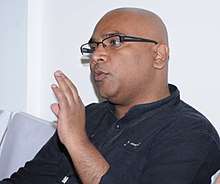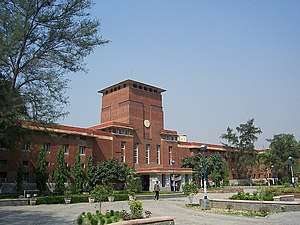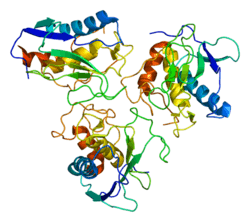Amit Dutt
| Amit Dutt | |
|---|---|
 | |
| Born |
6 September 1973 Patna, India |
| Residence | Mumbai, Maharashtra, India |
| Nationality | Indian |
| Alma mater | |
| Known for | Studies on Fibroblast growth factor receptor |
| Awards | |
| Scientific career | |
| Fields | |
| Institutions | |
| Doctoral advisor |
|
Amit Dutt (born 6 September 1973) is an Indian scientist, geneticist and the principal investigator at Advanced Centre for Treatment, Research and Education in Cancer (ACTREC) of Tata Memorial Centre. Known for his studies on Fibroblast growth factor receptor, Dutt is a Wellcome Trust / DBT India Alliance Intermediate Fellow. The Council of Scientific and Industrial Research, the apex agency of the Government of India for scientific research, awarded him the Shanti Swarup Bhatnagar Prize for Science and Technology, one of the highest Indian science awards, for his contributions to medical sciences in 2017.[1][note 1]
Biography

Amit Dutt, born on 6 September 1973 in Patna, capital of the Indian state of Bihar, earned a BSc in botany from Delhi University in 1994 and continued there to complete a post-graduate diploma in biochemical technology in 1995.[2][note 2] Moving to Jamia Millia Islamia, he obtained his MSc in 1998 and enrolled for doctoral studies at the Delhi center of the International Centre for Genetic Engineering and Biotechnology to secure a PhD in plant genetics in 2000, guided by Vanga Siva Reddy of Delhi University and Arif Ali of Jamia Millia Islamia.[3] Subsequently, he traveled to the University of Zurich and working under the guidance of Alex Hajnal at the Institute of Molecular Life Sciences of the university, secured another PhD in developmental biology in 2004.[4][5]
Dutt continued in Zurich to work with Adriano Aguzzi at the Institute of Neuropathology of the university and in 2005, he moved to join the laboratory of Matthew Meyerson at the Broad Institute of Harvard and MIT as a research associate and worked there till 2010, stationing at Dana–Farber Cancer Institute, a Harvard Medical School affiliate.[2] On his return to India in Oct 2010, he joined Tata Memorial Centre, at the Advanced Centre for Treatment, Research and Education in Cancer (ACTREC), Navi Mumbai where he is the principal investigator at scientist (grade F) and heads the Integrated Cancer Genomics Lab, popularly known as Dutt Lab.[6]
Legacy and honors

Dutt is known to have made notable contributions in the field of cancer genetics,[7] widening our understanding of the disease and its translational possibilities.[8] The group led by him have been engaged in the study of the progression of cancer in the lung, breast, cervical, gallbladder, head and neck and his research may be classified under three heads; cancer genomics, functional genomics and pathogen discovery.[6] It is reported that the research collaboration Dutt had with Kumar Prabhash of Tata Memorial Centre led to the Epidermal Growth Factor Receptor (EGFR) and KRAS mutation profiling of Indian lung cancer patients for the first time.[9] The research association between the duo has also led to the development of HPVDetector and TMC-SNPdb (both computational tools) and CRE, an experimental tool.[4] Discovery of MMP10 protein, a biomarker which assists the doctors in deciding the surgical protocol in tongue cancer patients is another contribution of Dutt, which was the result of collaborative research with Sudhir Nair of TMC.[10] They also identified a genome signature which associated tobacco chewing with oral cancer. His studies have been documented by way of a number of articles[11] and ResearchGate, an online article repository of scientific articles, has listed 118 of them.[12][note 3]
Dutt is a member of faculty of F1000 Prime and holds memberships in associations such as American Association for Cancer Research, the Indian chapter of Lung Cancer Consortium of Asia, Society of Biological Chemists (India), and Indian Association for Cancer Research.[13] He has also sat in the editorial boards of BMC Genomics and PLoS One journals.[9]
Awards and honors
Apart from a number of student fellowships, Dutt has held research fellowships, starting with the Julius Klaus Foundation Fellowship in 2004, followed by Swiss National Science Foundation Postdoctoral fellowship of the Government of Switzerland in 2005.[2] The Department of Biotechnology awarded him the Ramalingaswamy Fellowship in 2010[9][14] and he became a Wellcome Trust / DBT India Alliance Intermediate Fellow in 2011.[4] The Council of Scientific and Industrial Research awarded Dutt the Shanti Swarup Bhatnagar Prize, one of the highest Indian science awards in 2017.[15]
Selected bibliography
- Godbole M, Chandrani P, Gardi N, Dhamne H, Patel K, Yadav N, Gupta S, Badwe R, Dutt A (2017). "miR-129-2 mediates down-regulation of progesterone receptor in response to progesterone in breast cancer cells". Cancer Biol Ther. 18 (10): 801–805. doi:10.1080/15384047.2017.1373216. PMC 5678702. PMID 28876975.
- Upadhyay P, Gardi N, Desai S, Chandrani P, Joshi A, Dharavath B, Arora P, Bal M, Nair S, Dutt A (2017). "Genomic characterization of tobacco/nut chewing HPV-negative early stage tongue tumors identify MMP10 asa candidate to predict metastases". Oral Oncol. 73: 56–64. doi:10.1016/j.oraloncology.2017.08.003. PMC 5628952. PMID 28939077.
- Godbole M, Tiwary K, Badwe R, Gupta S, Dutt A (2017). "Progesterone suppresses the invasion and migration of breast cancer cells irrespective of their progesterone receptor status - a short report". Cell Oncol (Dordr). 40 (4): 411–417. doi:10.1007/s13402-017-0330-z.
- Chandrani P, Prabhash K, Prasad R, Sethunath V, Ranjan M, Iyer P, Aich J, Dhamne H, Iyer DN, Upadhyay P, Mohanty B, Chandna P, Kumar R, Joshi A, Noronha V, Patil V, Ramaswamy A, Karpe A, Thorat R, Chaudhari P, Ingle A, Choughule A, Dutt A (2016). "Drug-sensitive FGFR3 mutations in lung adenocarcinoma". Ann. Oncol. (published 2017). 28 (3): 597–603. doi:10.1093/annonc/mdw636. PMC 5391708. PMID 27998968.
- Mittra I, Samant U, Sharma S, Raghuram GV, Saha T, Tidke P, Pancholi N, Gupta D, Prasannan P, Gaikwad A, Gardi N, Chaubal R, Upadhyay P, Pal K, Rane B, Shaikh A, Salunkhe S, Dutt S, Mishra PK, Khare NK, Nair NK, Dutt A (2017). "Cell-free chromatin from dying cancer cells integrate into genomes of bystander healthy cells toinduce DNA damage and inflammation". Cell Death Discov. 3: 17015. doi:10.1038/cddiscovery.2017.15. PMC 5447133. PMID 28580170.
- Rekhi B, Upadhyay P, Ramteke MP, Dutt A (2016). "MYOD1 (L122R) mutations are associated with spindle cell and sclerosing rhabdomyosarcomas with aggressive clinical outcomes". Mod. Pathol. 29 (12): 1532–1540. doi:10.1038/modpathol.2016.144. PMC 5133269. PMID 27562493.
- Upadhyay P, Nair S, Kaur E, Aich J, Dani P, Sethunath V, Gardi N, Chandrani P,Godbole M, Sonawane K, Prasad R, Kannan S, Agarwal B, Kane S, Gupta S, Dutt S, Dutt A (2016). "Notch pathway activation is essential for maintenance of stem-like cells in early tongue cancer". Oncotarget. 7 (31): 50437–50449. doi:10.18632/oncotarget.10419. PMC 5226594. PMID 27391340.
- Upadhyay P, Gardi N, Desai S, Sahoo B, Singh A, Togar T, Iyer P, Prasad R, Chandrani P, Gupta S, Dutt A (2016). "TMC-SNPdb: an Indian germline variant database derived from whole exome sequences". Database. 2016: baw104. doi:10.1093/database/baw104. PMC 4940432. PMID 27402678. }
- Iyer P, Barreto SG, Sahoo B, Chandrani P, Ramadwar MR, Shrikhande SV, Dutt A (2016). "Non-typhoidal Salmonella DNA traces in gallbladder cancer". Infect Agent Cancer. 11: 12. doi:10.1186/s13027-016-0057-x. PMC 4776363. PMID 26941832.
- Chandrani P, Upadhyay P, Iyer P, Tanna M, Shetty M, Raghuram GV, Oak N, Singh A, Chaubal R, Ramteke M, Gupta S, Dutt A (2015). "Integrated genomics approach to identify biologically relevant alterations in fewer samples". BMC Genomics. 16: 936. doi:10.1186/s12864-015-2138-4. PMC 4647579. PMID 26572163.
- Chandrani P, Kulkarni V, Iyer P, Upadhyay P, Chaubal R, Das P, Mulherkar R, Singh R, Dutt A (2015). "NGS-based approach to determine the presence of HPV and their sites of integration in human cancer genome". Br J Cancer. 112 (12): 1958–65. doi:10.1038/bjc.2015.121. PMC 4580395. PMID 25973533.
- Choughule A, Sharma R, Trivedi V, Thavamani A, Noronha V, Joshi A, Desai S, Chandrani P, Sundaram P, Utture S, Jambhekar N, Gupta S, Aich J, Prabhash K, Dutt A (2014). "Coexistence of KRAS mutation with mutant but not wild-type EGFR predicts response to tyrosine-kinase inhibitors in human lung cancer". Br J Cancer. 111 (11): 2203–4. doi:10.1038/bjc.2014.401. PMC 4260019. PMID 25117816.
- Barreto SG, Dutt A, Chaudhary A (2014). "A genetic model for gallbladder carcinogenesis and its dissemination". Ann. Oncol. 25 (6): 1086–97. doi:10.1093/annonc/mdu006. PMC 4037856. PMID 24705974.
- Chougule A, Prabhash K, Noronha V, Joshi A, Thavamani A, Chandrani P, Upadhyay P, Utture S, Desai S, Jambhekar N, Dutt A (2013). "Frequency of EGFR mutations in 907 lung adenocarcioma patients of Indian ethnicity". PLoS One. 8 (10): e76164. doi:10.1371/journal.pone.0076164. PMC 3790706. PMID 24124538.
- Noronha V, Prabhash K, Thavamani A, Chougule A, Purandare N, Joshi A, Sharma R, Desai S, Jambekar N, Dutt A, Mulherkar R. (2013). "EGFR mutations in Indian lung cancer patients: clinical correlation and outcome to EGFR targeted therapy". PLoS One. 8 (4): e61561. doi:10.1371/journal.pone.0061561. PMC 3631198. PMID 23620765.
- Dutt A, Ramos AH, Hammerman PS, Mermel C, Cho J, Sharifnia T, Chande A, Tanaka KE, Stransky N, Greulich H, Gray NS, Meyerson M (2011). "Inhibitor-sensitive FGFR1 amplification in human non-small cell lung cancer". PLoS One. 6 (6): e20351. doi:10.1371/journal.pone.0020351. PMC 3110189. PMID 21666749.
- Dutt A, Salvesen HB, Greulich H, Sellers WR, Beroukhim R, Meyerson M. (2009). "Somatic mutations are present in all members of the AKT family in endometrial carcinoma". Br J Cancer. 101 (7): 1218–9. doi:10.1038/sj.bjc.6605301. PMC 2768084.
- Dutt A, Salvesen HB, Chen TH, Ramos AH, Onofrio RC, Hatton C, Nicoletti R,Winckler W, Grewal R, Hanna M, Wyhs N, Ziaugra L, Richter DJ, Trovik J, Engelsen IB, Stefansson IM, Fennell T, Cibulskis K, Zody MC, Akslen LA, Gabriel S, Wong KK, Sellers WR, Meyerson M, Greulich H (2008). "Drug-sensitive FGFR2 mutations in endometrial carcinoma". Proc Natl Acad Sci U S A. 105 (25): 8713–7. doi:10.1073/pnas.0803379105. PMC 2438391. PMID 18552176.
- Dutt A, Canevascini S, Froehli-Hoier E, Hajnal A (2004). "EGF signal propagation during C. elegans vulval development mediated by ROM-1 rhomboid". PLoS Biol. 2 (11): e334. doi:10.1371/journal.pbio.0020334. PMC 519001. PMID 15455032.
See also
Notes
References
- ↑ "View Bhatnagar Awardees". Shanti Swarup Bhatnagar Prize. 2017-11-11. Retrieved 2017-11-11.
- 1 2 3 "Biographical Information - Amit Dutt" (PDF). ACTREC. 2017-11-03. Retrieved 2017-11-03.
- ↑ "Dr. Amit Dutt-Biography". ACTREC. 2017-11-05. Retrieved 2017-11-05.
- 1 2 3 "About Fellow-Dutt". Wellcome-DBT. 2017-11-05. Retrieved 2017-11-05.
- ↑ "Amit Dutt, B.Sc, Ph.D., Ph.D. Principal Investigator". India Cancer Research Database. 2017-11-05. Retrieved 2017-11-05.
- 1 2 "Integrated Cancer Genomics Lab". ACTREC. 2017-11-05. Retrieved 2017-11-05.
- ↑ "Brief Profile of the Awardee". Shanti Swarup Bhatnagar Prize. 2017-10-21. Retrieved 2017-10-21.
- ↑ "Handbook of Shanti Swarup Bhatnagar Prize Winners" (PDF). Council of Scientific and Industrial Research. 2017-10-17. Retrieved 2017-10-17.
- 1 2 3 "It's a Moment of Pride for Jamia Millia". Okhla Times. 1 October 2017. Retrieved 2017-11-05.
- ↑ "Biomarker tells of tongue cancer spread". The Hindu. 23 August 2017. Retrieved 2017-11-05.
- ↑ "On Google Scholar". Google Scholar. 2017-10-17. Retrieved 2017-10-17.
- ↑ "On ResearchGate". On ResearchGate. 2017-10-17. Retrieved 2017-10-17.
- ↑ "F1000 Prime faculty". F1000 Prime. 2017-11-05. Retrieved 2017-11-05.
- ↑ "List of Fellows". Ramalingaswami Fellows. 2017-11-06. Retrieved 2017-11-06.
- ↑ "10 scientists receive Shanti Swarup Bhatnagar Prize". The Hindu. 26 September 2017. Retrieved 2017-11-11.
Further reading
- "Amit Dutt - Research Summary". Wellcome Trust - DBT India Alliance. 2017-11-05. Retrieved 2017-11-05.
External links
- "Amit Dutt on PubMed". PubMed. 2017-11-05. Retrieved 2017-11-05.